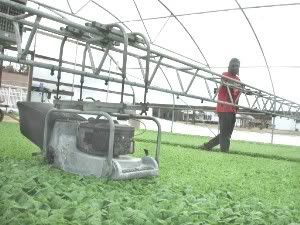
Mowing young tobacco in greenhouse of half million plants (Hemingway, South Carolina)
Besides tobacco, many vegetables and flowers are grown in greenhouses in late winter and early spring, then transplanted outside as the weather warms. Started plants are usually available for gardeners in farmers' markets at transplanting time.
The closed environment of a greenhouse has its own unique requirements, compared with outdoor production. Pests and diseases, and extremes of heat and humidity, have to be controlled, and irrigation is necessary to provide water. Significant inputs of heat and light may be required, particularly with winter production of warm-weather vegetables. Special greenhouse varieties of certain crops, like tomatoes, are generally used for commercial production.












